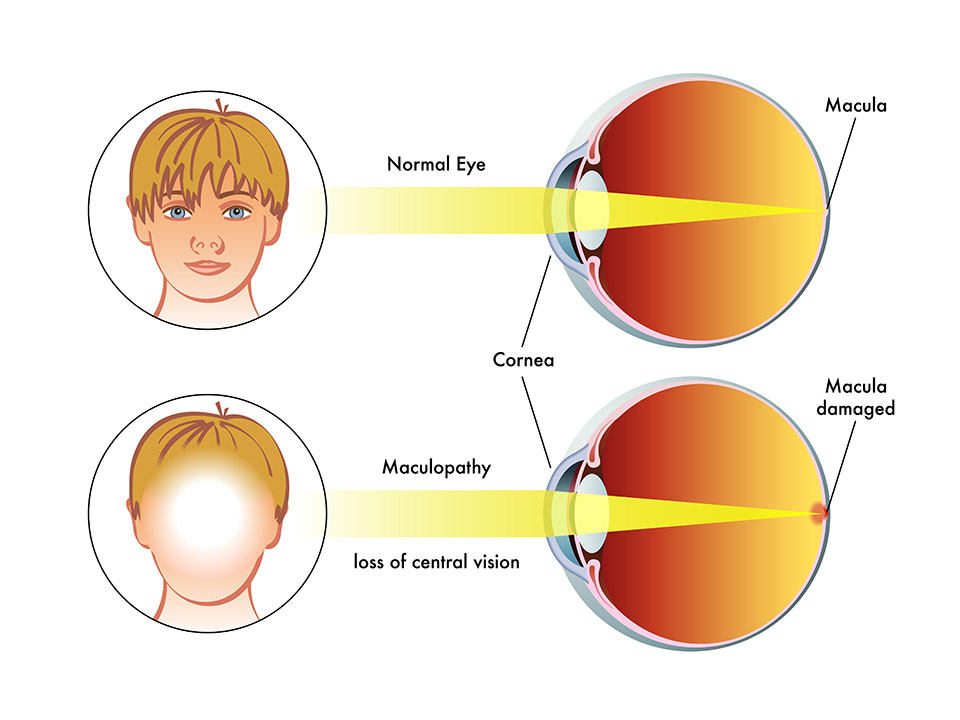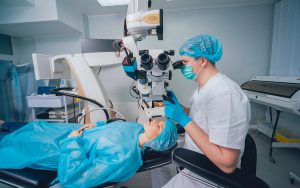Answers to Top Macular Degeneration Questions

Nothing can be as shocking as realizing you have wet age-related macular degeneration (wet AMD). AMD is a chronic eye disorder and the leading cause of severe vision loss and legal blindness in adults over 60 in the U.S. The Centers for Disease Control reports that this chronic eye condition affects 14-24% of the U.S. population aged 65-74 and 35-40% of people 75 and older.
The prognosis of this condition can be traumatizing. While AMD alone never causes total blindness, losing any amount of vision can significantly impact your quality of life. The World Health Organization further reports that the number of Americans with AMD will grow to approximately 5 million by 2050.
How do you manage the fear and trauma of an AMD diagnosis? It would help if you got answers from a professional ophthalmologist.
We’ve sampled five vital answers that will help address your concerns about wet AMD and empower you to understand your treatment and care options clearly.
How do I know I have wet AMD?
Common symptoms of age-related macular degeneration appear in almost every patient. However, each individual may experience symptoms differently. If you suspect you have AMD, look for clues such as sudden distortion or decrease in your vision, and developing a clouding, especially in the center of your eye.
These symptoms indicate a more advanced form of AMD and require immediate medical attention. According to research by the National Institute of Health, developing a clouding in the center of the eye could indicate bleeding in the eye.
Another common sign of wet AMD is the presence of drusen. These are tiny yellow deposits in the retina. The appearance of Drusen may mean the eye is at risk for developing more severe age-related macular degeneration. Only an eye exam by an ophthalmologist can reveal the presence of drusen.
Also, you should seek immediate treatment if you experience the following symptoms:
- Blurry or fuzzy vision
- Straight lines appear wavy
- Difficulty recognizing a familiar face
- A dark, empty area or blind spot appears in the center of the vision
- Loss of central vision
Most of the symptoms of age-related macular degeneration may look like other eye conditions; hence you need to seek for professional eye diagnosis.
Why Did I Get Wet AMD?
It can be frustrating to learn that you have wet AMD because it might affect your vision permanently. Several researchers say that environment and lifestyle play a role in the development of wet AMD. But your risk is at least three times higher if you have an AMD family history. Thus, early diagnosis is vital if AMD runs in your family.
A lot of the risk associated with developing wet AMD has to do with genetics, which you have no control over. According to Nicolas A. Yannuzzi, M.D., an assistant professor of clinical ophthalmology, people with lighter-colored eyes are more likely to be diagnosed with wet AMD.
Also, environmental factors, such as cigarette smoke exposure, increase the risk of developing advanced AMD. If you smoke, quitting might decrease your chances of developing AMD.
What Is the Treatment Procedure for Wet AMD?
Your doctor will mostly prescribe anti-VEGF drugs that may help stop the growth of new blood vessels. So, expect regular drug injections that block the growth of new blood vessels. These medicines are considered the first-line treatment for all stages of wet macular degeneration.
The anti-VEGF drugs require an injection directly into your eye. Apart from minimal discomfort caused by a sensation of pressure, the injection doesn’t make you uncomfortable. Alternatively, your ophthalmologist might administer a numbing shot before injecting the medicine into your eye.
Also, you may need regular eye injections and a once-in-a-while light treatment called photodynamic therapy to prevent your vision from worsening.
Can I Go Completely Blind From AMD?
Unless treated early enough, AMD might cause you to lose central vision. Thus, making it harder to see faces, read, drive, or do close-up work like cooking or fixing things around the house. Age-related macular degeneration doesn’t, however, cause complete blindness.
Significant central vision loss is scary, but an early diagnosis will ensure you preserve as much of your sight as possible. AMD progresses quickly in some people and relatively slower in other people.
Either AMD type affects your central vision because your macula may be damaged or scarred. Your central vision helps you to see straight on. It also enables you to see objects both up close and far away. Fortunately, AMD doesn’t impact your side or peripheral vision.
Wet AMD may elevate your risk of vision loss and blindness if you don’t go for early detection and treatment.
How Long Does It Take to Lose Your Vision If You Have Macular Degeneration?
The most common form of AMD is the dry macular degeneration. But the most common cause of vision loss in adults over 50 is wet AMD, which causes faster vision loss. No research has established the exact timeline to predict vision loss from AMD. But the effects of wet forms of AMD can be so rapid and severe that you may notice symptoms in as little as one day.
Some of these early signs may impact your central vision. You may begin to notice that your overall vision is blurred or distorted. An early eye examination is essential in identifying AMD or Choroidal neovascularization that causes wet AMD symptoms.
Takeaway
AMD is a chronic eye condition that may cause severe vision problems if not treated early. Wet AMD is even worse as it causes more acute vision problems. The best form of prevention and treatment is going for regular check-ups. Also, you need to follow your treatment plan carefully.
Sudden changes in your vision or symptoms such as blurriness, distortion, or blind spots should prompt you to an urgent appointment with an eye doctor. Talk to your doctor to book an appointment if you notice any changes.




